The internet came to India in 1995 and with it came a host of opportunities for this rising economy and developing nation. A few tech pioneers grabbed this opportunity and explored this brave new connected world.
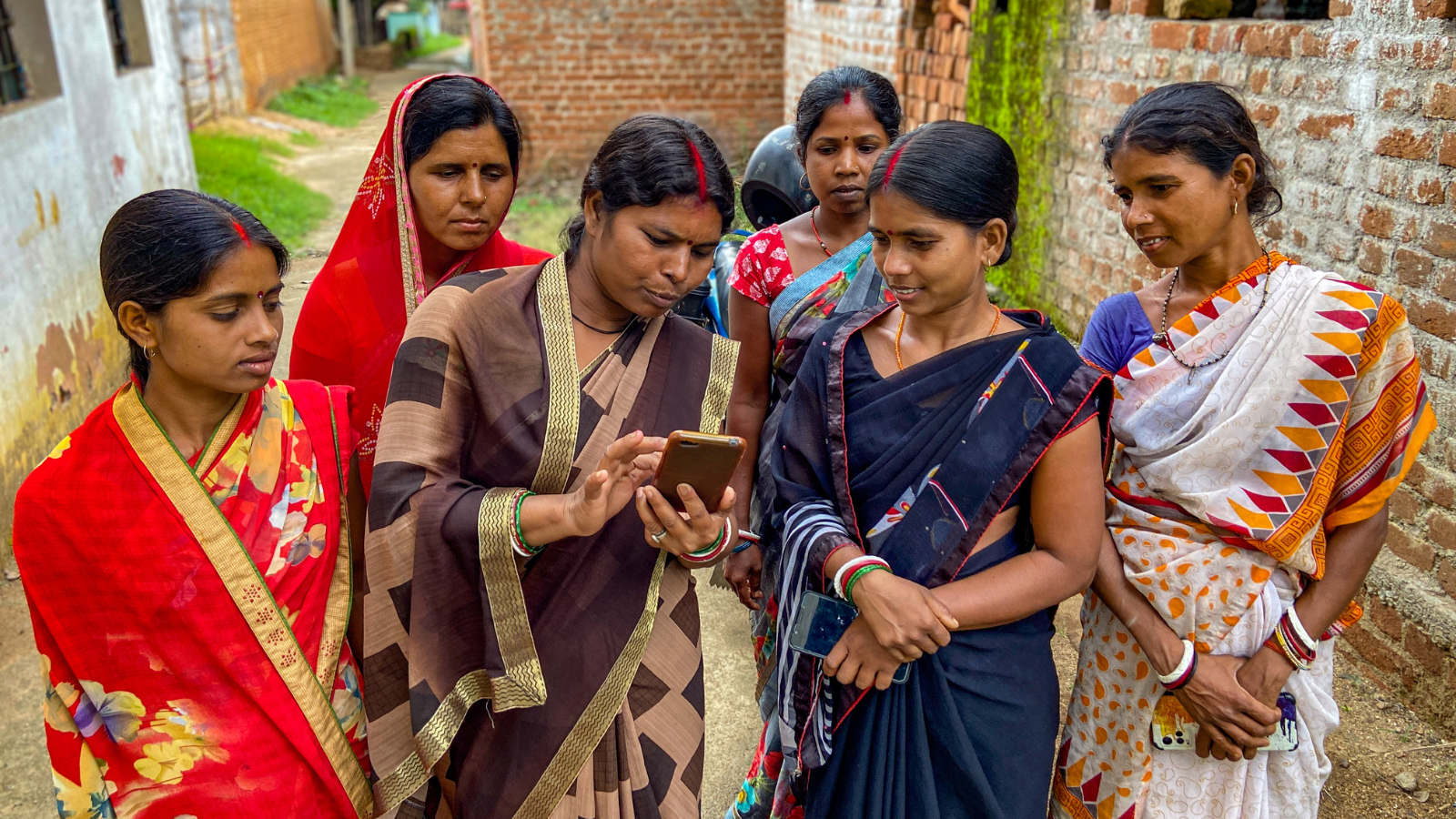
Seven years later, on the 16th of December 2002, the Digital Empowerment Foundation (DEF) was established to connect and empower India’s one billion plus people, taking the first step in the country’s digital development story. At the time, most Indians did not have access to information, education, and opportunities. Our mission is to bridge that through digital literacy and tools, bringing government services within reach of its people.
In 2002, less than 17 million people had access to the internet, making up only 1.5% of the country’s total population. DEF set out first to change this and, in time, bridge this digital divide through policy interventions and on-ground work. Fast forward two decades later, nearly 700 million people—about half of the country—can now access the internet.
Internet use has been slower to take hold in rural India, where around 65% of the population lives
While today’s digital issues are far more complex and require comprehensive solutions, in many ways, the fundamental challenge remains the same: the digital divide is still holding the country back.
The 98.5% who did not have access to the internet in 2002 were not in complete ‘information darkness’, but in this hyperconnected post-COVID world, the 50% who are offline are excluded more than ever.
To close the digital divide and provide access to information and digital services, DEF works across finance, governance, education, livelihood, and health to empower communities in rural, tribal, marginalised, and unreached areas.
Here are ten photos from the past year that illustrate the persistent digital divide in India and what’s being done to close it.

In rural India, persons with disabilities, Ashok, Sabina and Salma* (not their real names), interact with their mentors for guidance and support to help them achieve their goals. Under DEF’s Going Online As Leaders (GOAL) programme, selected participants are matched with experienced mentors who will provide needed advice and coaching tailored to them during their weekly calls and check-ins to follow up on their progress. Throughout the programme, there has been a significant improvement in the participants’ confidence and self-esteem.
In addition, digital literacy classes are also given through DEF’s Community Information Resource Centre (CIRC) in the region. Participants are also provided with digital tools and get help setting up their own digital centres, making them SoochnaPreneurs (Digital Information Entrepreneurs) who provide digital services to their communities.
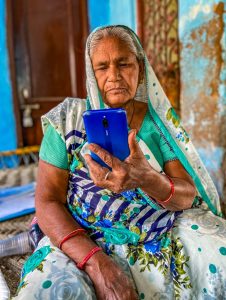 Savitri* and many adults without formal schooling like her are taking digital literacy classes to access information and avail services using their mobile phones. DEF strongly believes that digital is a tool that must be accessible to all, even those without formal education. Therefore, we developed a curriculum that uses symbols and voice assistance to aid first-generation internet users.
Savitri* and many adults without formal schooling like her are taking digital literacy classes to access information and avail services using their mobile phones. DEF strongly believes that digital is a tool that must be accessible to all, even those without formal education. Therefore, we developed a curriculum that uses symbols and voice assistance to aid first-generation internet users.
Traditionally, India relies on oral communication as much as its written form, and now technology gives us an opportunity to continue that without being excluded from digital services. Many of the community members we work with use voice notes and voice commands to navigate their digital devices, so having that option democratises information and access that historically has only been available to the educated and upper class. Through this and other programmes, DEF is leveraging the power of digital technology to expand access to information across the country.

While more than half of the country is now online, internet use has been slower to take hold in rural India, where around 65% of the population lives. Rural communities primarily depend on government services for some of their most basic needs and livelihood.
SoochnaPreneur is a rural entrepreneurship-based project initiated by DEF to empower the youth in the villages to sustain their livelihood by providing access to those living in areas with little to no infrastructure. The programme selects women as SoochnaPreneurs because, in our experience in the last 20 years, there are three key benefits.
First, we ensure greater reliability and accountability. Second, by empowering a woman to become a SoochnaPreneur, other women in the village also gain access. Due to patriarchal norms in rural India, it is much easier for a woman to approach a centre run by a woman rather than a man. And finally, by enabling women to generate income, we ensure their entire family benefits.
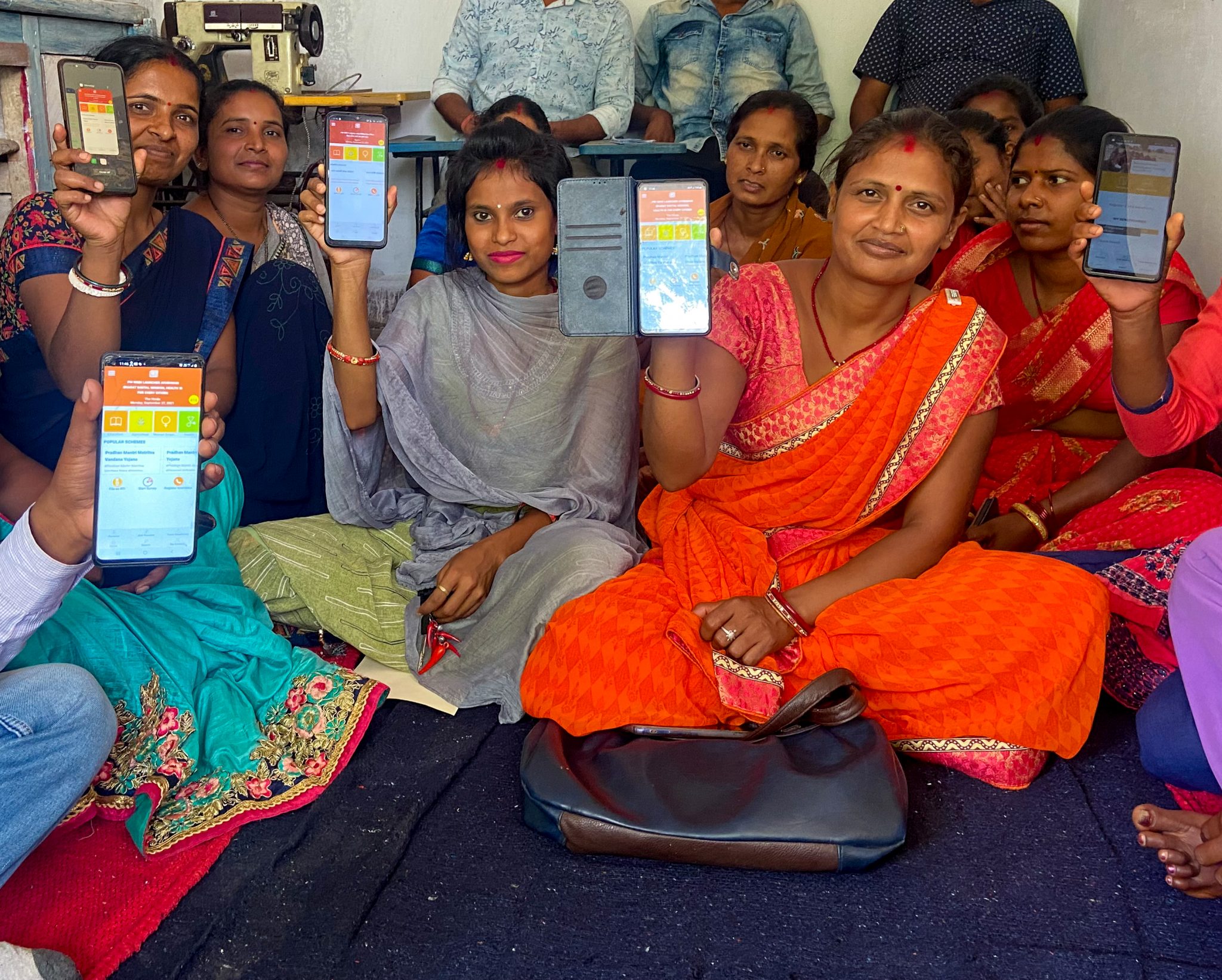
A smartphone in a woman’s hand not only empowers her and her family, but her entire community. The women use MeraApp to access a huge database of government entitlements available for their communities. MeraApp is a platform that provides information and facilitates the delivery of welfare schemes to empower communities through access to rights and benefits like healthcare, education, social security, finance, disability, and livelihood.
Along with providing access to government entitlements and schemes, MeraApp is also used to monitor and evaluate SoochnaPreneurs, ensuring things are running smoothly and challenges are dealt with immediately.
“I am still learning how to use it, but what I have already learnt is how important it is.”
but what I have already learnt is how important it is.”
Transitioning to the smartphone world. “I am still learning how to use it, but what I have already learnt is how important it is.” Renu* is still struggling with the concept of a smartphone. However, she is familiar with a feature phone, so she carries that with her to make calls. Since she is a part of the digital literacy training that DEF is doing in Rajasthan, she is also carrying a smartphone to learn how to use it.
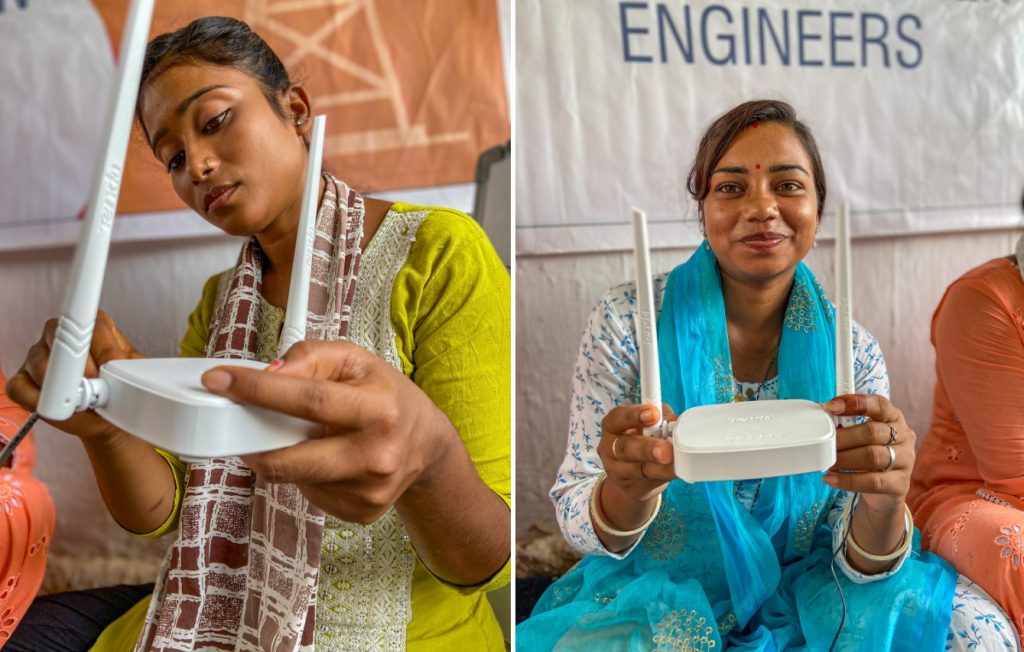
Pooja* is learning how to provide internet access to her community which has so far been completely disconnected from the digital world. Under the Women Wireless Engineers programme, DEF trains 165 women to become wireless engineers and set up wireless networks in their remote villages. This training enables them to bring their villages online and connect their communities to the world.
Through this initiative, DEF is not only training these women but also setting up 15 digital centres that will act as internet hubs and focal points of information for the entire community to access. By connecting them online through women entrepreneurs, DEF ensures they gain access to meaningful connectivity because, along with the internet, these women will also facilitate access to relevant information for their communities.
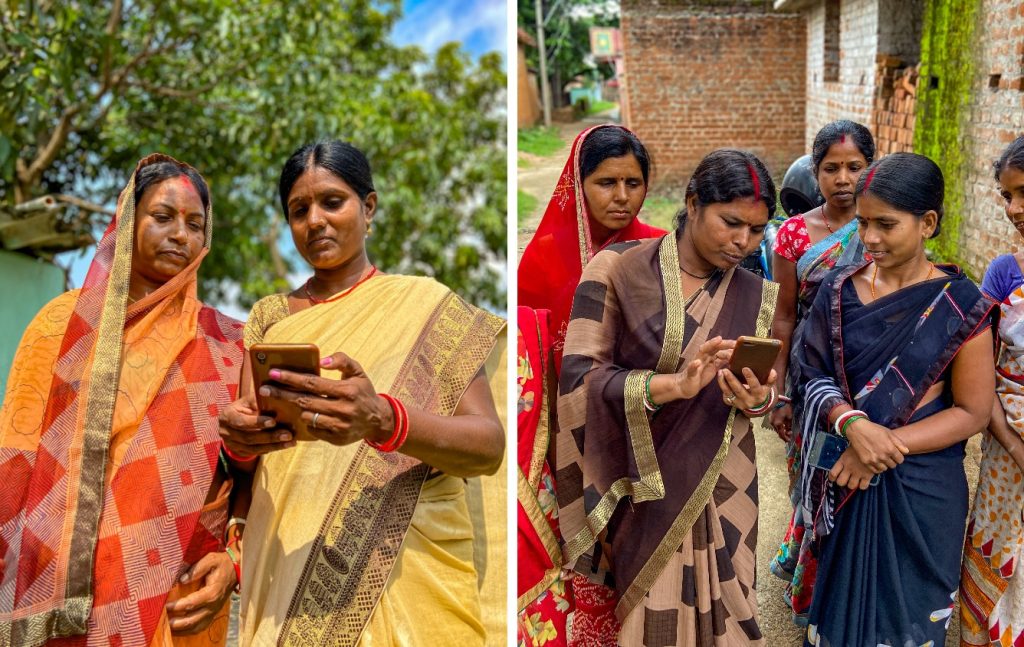
There are 8.05 million women entrepreneurs in India. Studies show that women-run businesses are more efficient and profitable. DEF introduced the Digital Sarthak to promote women’s entrepreneurship, an initiative that seeks to bring women entrepreneurs online and help them expand their businesses using digital tools. The programme targets over 16,000 rural women nano-entrepreneurs through 200 Digital Sarthak trainers. The ten-module training enables them to take their businesses online using WhatsApp, Facebook, and e-commerce platforms.
“Because of the training, I am able to reach out to customers from neighbouring villages as well using WhatsApp. It has helped grow my business,” said Neelam*, one of the women under the programme. DEF believes in promoting village-level businesses to move away from the mainstream idea of smart cities and instead build resilient smart villages that sustain themselves.
“Because of the training, I am able to reach out to customers from neighbouring villages as well using WhatsApp. It has helped grow my business.”
Over the last 20 years, DEF has minutely and consciously made all of its programmes women-centric to ensure greater success. Working with women in rural India ensures not only their empowerment but also the empowerment of their communities, as proven by our experience over the past two decades; women are more accountable, honest, and dedicated to working for their communities.
Since there is a trend of rural-to-urban migration, by enabling women to become SoochnaPreneurs, we ensure that the centre keeps up as, in most cases, it is the man who migrates to urban areas for work, leaving his family in the village. By creating livelihood for women, we can also ensure that the money goes to the household, not just the individual. Because culturally, in India, women tend to be more responsible towards their families.
Whether through the Digital Sarthak or the Women Wireless Engineers programme, we are working towards making India’s rural economy more robust to bring about a more equitable country that doesn’t face the rural-urban, village-city, unconnected-connected, and poor-rich divide. Even though digital is not the solution to all problems, bridging the digital divide makes communities more democratic by providing equal access to opportunities to all.
About DEF
The Digital Empowerment Foundation (DEF) is a Delhi-based nonprofit organisation working to empower people at the edge of information through last-mile connectivity, digital literacy, and digital interventions. DEF is a partner organisation of GDIP. Learn more at defindia.org
About GDIP
The Global Digital Inclusion Partnership is a coalition of public, private, and civil society organizations working to bring internet connectivity to the global majority and ensure everyone is meaningfully connected by 2030. GDIP advances digital opportunities to empower and support people’s lives and agency, leading to inclusive digital societies.










